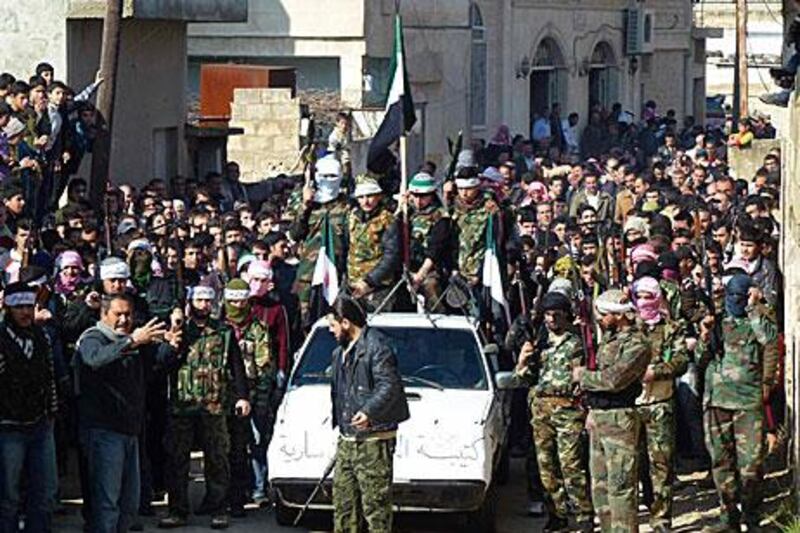The US and its allies will put immense pressure on Bashar Al Assad to step down after Russia and China vetoed a resolution calling on the Syrian president to quit, the US secretary of state said yesterday.
"Faced with a neutered Security Council, we have to redouble our efforts outside the United Nations with those allies and partners who support the Syrian people's right to have a better future," Hillary Clinton said.
The US will also work to strengthen sanctions and "expose those funding Assad's regime", she said.
The veto gives Mr Assad a "licence to kill", said Khalid Al Attiyah, Qatar's minister of state for foreign affairs. "Yesterday was a sad day," he said. "This is exactly what we feared."
Russia and China vetoed a proposal by western and Arab countries at the UN on Saturday that backed an Arab League plan for political transition in Syria. It was the second time they had blocked attempts at the UN to hold Mr Assad accountable for the conflict.
"The Cold War logic continues," said the Turkish foreign minister, Ahmet Davutoglu. "Russia and China did not vote based on the existing realities but more a reflexive attitude against the West."
The Russian foreign minister, Sergei Lavrov, and Moscow's foreign intelligence service chief, Mikhail Fradkov, will visit Damascus tomorrow to meet Mr Assad.
Russia sells Syria weapons and its only military base outside the former Soviet Union is in the Syrian port of Tartus.
The visit tomorrow "indicates that Moscow knows the regime is in trouble", said Andrew J Tabler, a fellow at the Washington Institute for Near East Policy. "They want to try to see if they can prop it up by convincing it to reform - the one thing this regime has proven incapable of doing for over four decades."
The veto will embolden Mr Al Assad to further repress his people, said Paul Sullivan, a specialist in Middle East security at Georgetown University in Washington.
"There has been some consideration given to tightening sanctions, but without the arms embargo this will end up probably hurting the people it might be intended to help more than those in power."
The British foreign secretary, William Hague, said Syria's government was bound to fall and the UN Security Council would return to the subject of violence in Syria.
"This is a doomed regime, as well as a murdering regime," Mr Hague told Sky News. "There's no way it can get its credibility back."
The Arab League imposed sanctions on the regime in November and sent monitors to the country in an effort to stop the violence. The league later drafted a plan that called for the formation of a national unity government within two months to implement a peaceful handover of power.
The Russian ambassador to the UN, Vitaly Churkin, said that while he "would certainly agree tragic events are happening" in Syria, his country had "made an honest effort". He said the Arab League "shall not count on the Council" for endorsement of a plan that imposes a timeline on when Mr Assad should leave.
Russia's alignment with Syria may put at stake the country's relationship with Gulf states, led by Qatar, who asked the Security Council to endorse their plan to convince Mr Assad to delegate his powers to a deputy to pave way for elections.
"The Russians are doing this to help preserve their navy base in Tartus, their arms trade with Syria and their strategic position in the Eastern Mediterranean," Mr Sullivan said. "In the end, Russia will lose its base. Russia has also in many ways lost the Arabs on this."
The Syrian army again shelled the city of Homs yesterday, and 27 people were killed in violence across the country yesterday, activists said.
Syrian rebels killed nine soldiers in fighting overnight in Idlib, 21 soldiers were wounded and four military vehicles were damaged, the UK-based Syrian Observatory for Human Rights said.
In Istanbul yesterday, Turkish police fired tear gas to disperse protesters who were seeking to storm the Syrian consulate. Between 300 and 400 Syrian and Turkish demonstrators gathered in front of the mission, throwing objects at the building and chanting slogans.
As they sought to break into the mission, they were repelled by police. The attack on the consulate in Istanbul follows similar incidents in Athens, Berlin, Cairo, Kuwait, London and Canberra, as news spread of the Homs shelling on Saturday, which the Syrian opposition said killed more than 200 civilians.
* Bloomberg, with additional reporting by Reuters and Agence France-Presse





